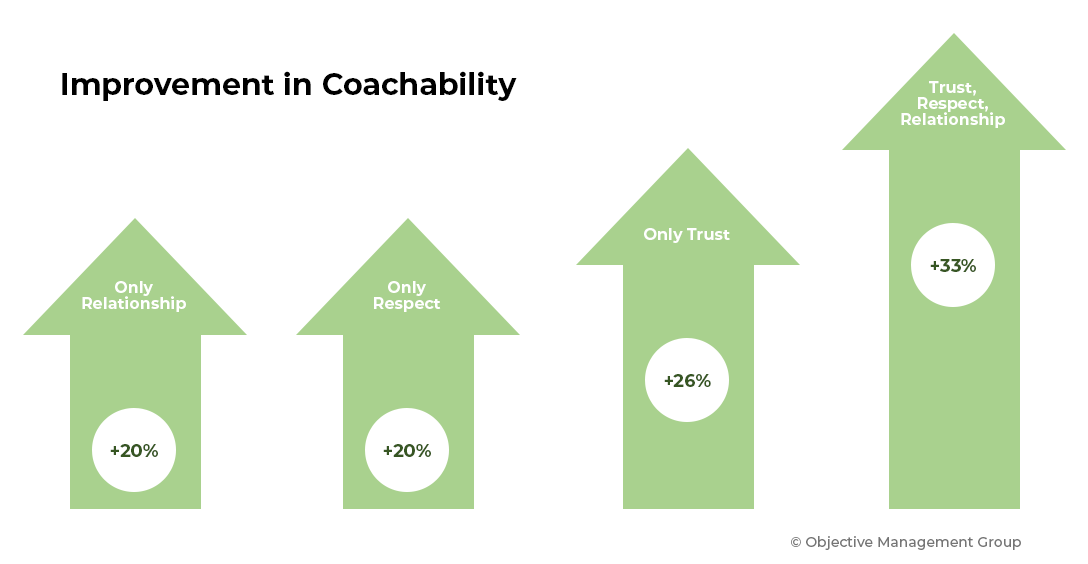
Want To Make Your Salespeople More Coachable? First Gain Their Trust.
Key Takeaways
- The most coachable salespeople have +13% higher Sales Percentile than the least coachable salespeople
- Salespeople who trust, respect, and have a relationship with their manager are +33% more Coachable
- Trust, respect, and a strong relationship also improves a salesperson’s Outlook and Responsibility
Intro
CEOs and CROs will often ask OMG’s Partners, “Are our salespeople trainable? Are we coaching our teams in the right way to significantly increase our revenue?” In this series of blog posts, we’ll dig into what conditions sales teams need to develop the skills required to increase revenue.
Coaching is necessary, but alone it’s not enough. Sales Managers need to make sure their teams are receptive to the coaching that they receive. How can managers do that?
To answer this, we analyzed Sales Evaluations of over 11,000 salespeople and their managers. The data clearly shows that how salespeople view the quality of their relationship with their manager has a profound effect on their performance. The heart of the impact, unsurprisingly, lies in how open they are to the coaching efforts of their manager.
What does it mean to be Coachable? And why does it matter?
OMG’s “Coachable” finding explains to what degree a sales leader should be able to coach a frontline salesperson. Salespeople who score low on Coachability are less likely to make the changes necessary to improve their performance. And being coachable does lead to better performance – our data shows that the most coachable salespeople have +13% higher Sales Percentile than the least coachable salespeople.
So, how can managers make sure their sales people are coachable?
Salespeople are significantly more Coachable when they trust, respect, and have a relationship with their manager.
Each component of trust, respect, and relationship building matters. Salespeople who trust their sales manager’s intentions score 26% higher on Coachability compared to salespeople who do not trust their managers. Similarly, salespeople who respect their manager are 20% more Coachable. Salespeople who have a relationship that is strong enough to withstand constructive criticism are also 20% more Coachable.
These qualities all build on each other. When trust, respect, and a strong relationship are all present, salespeople are 33% more Coachable than when none of these qualities exist.

Trust, respect, and a strong relationship between a salesperson and their manager also improves the salesperson’s Outlook and Responsibility
Trust, respect, and relationship building don’t just make a salesperson more Coachable. Salespeople who have a relationship with their manager score 19% better on Responsibility than salespeople who do not have a relationship with their manager. Similarly, salespeople who respect their managers score 13% better on Outlook than salespeople who do not respect their managers.
Our data tells us that a healthy salesperson-manager relationship produces employees who take ownership of their performance and who are enthusiastic about their individual growth prospects within the company. The implications for employee retention are obvious: employees with strong Outlook and Responsibility are going to be retained at higher rates compared to employees who are more detached and pessimistic.
Sales Leaders, do you have an accurate read on your managers’ relationship with their sales teams?
A trusting relationship between managers and their salespeople is the cornerstone for improving all the salesperson’s other skills and ultimately building an accountable and resilient sales team. Do your salespeople trust and respect their managers? How do you know you’re getting an honest view from your salespeople and not the filtered truth?
To run a customized version of this analysis for your organization, contact your OMG certified Partner.
Subscribe to Our Research Blog

